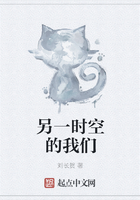It was in fact Mrs.Blessingbourne, who had under her arm the book she had gone up for--a pair of covers showing this time a pretty, a candid blue.She was followed next minute by the servant, who brought in tea, the consumption of which, with the passage of greetings, inquiries and other light civilities between the two visitors, occupied a quarter of an hour.Mrs.Dyott meanwhile, as a contribution to so much amenity, mentioned to Maud that her fellow guest wished to scold her for the books she read--a statement met by this friend with the remark that he must first be sure about them.But as soon as he had picked up the new, the blue volume he broke out into a frank "Dear, dear!""Have you read that too?" Mrs.Dyott inquired."How much you'll have to talk over together! The other one," she explained to him, "Maud speaks of as terribly tame.""Ah I must have that out with her! You don't feel the extraordinary force of the fellow?" Voyt went on to Mrs.
Blessingbourne.
And so, round the hearth, they talked--talked soon, while they warmed their toes, with zest enough to make it seem as happy a chance as any of the quieter opportunities their imprisonment might have involved.Mrs.Blessingbourne did feel, it then appeared, the force of the fellow, but she had her reserves and reactions, in which Voyt was much interested.Mrs.Dyott rather detached herself, mainly gazing, as she leaned back, at the fire; she intervened, however, enough to relieve Maud of the sense of being listened to.That sense, with Maud, was too apt to convey that one was listened to for a fool."Yes, when I read a novel I mostly read a French one," she had said to Voyt in answer to a question about her usual practice; "for I seem with it to get hold more of the real thing--to get more life for my money.Only I'm not so infatuated with them but that sometimes for months and months on end I don't read any fiction at all."The two books were now together beside them."Then when you begin again you read a mass?""Dear no.I only keep up with three or four authors."He laughed at this over the cigarette he had been allowed to light.
"I like your 'keeping up,' and keeping up in particular with 'authors.'""One must keep up with somebody," Mrs.Dyott threw off.
"I daresay I'm ridiculous," Mrs.Blessingbourne conceded without heeding it; "but that's the way we express ourselves in my part of the country.""I only alluded," said Voyt, "to the tremendous conscience of your ***.It's more than mine can keep up with.You take everything too hard.But if you can't read the novel of British and American manufacture, heaven knows I'm at one with you.It seems really to show our sense of life as the sense of puppies and kittens.""Well," Maud more patiently returned, "I'm told all sorts of people are now doing wonderful things; but somehow I remain outside.""Ah it's THEY, it's our poor twangers and twaddlers who remain outside.They pick up a living in the street.And who indeed would want them in?"Mrs.Blessingbourne seemed unable to say, and yet at the same time to have her idea.The subject, in truth, she evidently found, was not so easy to handle."People lend me things, and I try; but at the end of fifty pages--""There you are! Yes--heaven help us!"
"But what I mean," she went on, "isn't that I don't get woefully weary of the eternal French thing.What's THEIR sense of life?""Ah voila!" Mrs.Dyott softly sounded.
"Oh but it IS one; you can make it out," Voyt promptly declared.
"They do what they feel, and they feel more things than we.They strike so many more notes, and with so different a hand.When it comes to any account of a relation say between a man and a woman--Imean an intimate or a curious or a suggestive one--where are we compared to them? They don't exhaust the subject, no doubt," he admitted; "but we don't touch it, don't even skim it.It's as if we denied its existence, its possibility.You'll doubtless tell me, however," he went on, "that as all such relations ARE for us at the most much ******r we can only have all round less to say about them."She met this imputation with the quickest amusement."I beg your pardon.I don't think I shall tell you anything of the sort.Idon't know that I even agree with your premiss.""About such relations?" He looked agreeably surprised."You think we make them larger?--or subtler?"Mrs.Blessingbourne leaned back, not looking, like Mrs.Dyott, at the fire, but at the ceiling."I don't know what I think.""It's not that she doesn't know," Mrs.Dyott remarked."It's only that she doesn't say."But Voyt had this time no eye for their hostess.For a moment he watched Maud."It sticks out of you, you know, that you've yourself written something.Haven't you--and published? I've a notion I could read YOU.""When I do publish," she said without moving, "you'll be the last one I shall tell.I HAVE," she went on, "a lovely subject, but it would take an amount of treatment--!""Tell us then at least what it is."
At this she again met his eyes."Oh to tell it would be to express it, and that's just what I can't do.What I meant to say just now," she added, "was that the French, to my sense, give us only again and again, for ever and ever, the same couple.There they are once more, as one has had them to satiety, in that yellow thing, and there I shall certainly again find them in the blue.""Then why do you keep reading about them?" Mrs.Dyott demanded.
Maud cast about."I don't!" she sighed."At all events, I shan't any more.I give it up.""You've been looking for something, I judge," said Colonel Voyt, "that you're not likely to find.It doesn't exist.""What is it?" Mrs.Dyott desired to know.
"I never look," Maud remarked, "for anything but an interest.""Naturally.But your interest," Voyt replied, "is in something different from life.""Ah not a bit! I LOVE life in art, though I hate it anywhere else.














